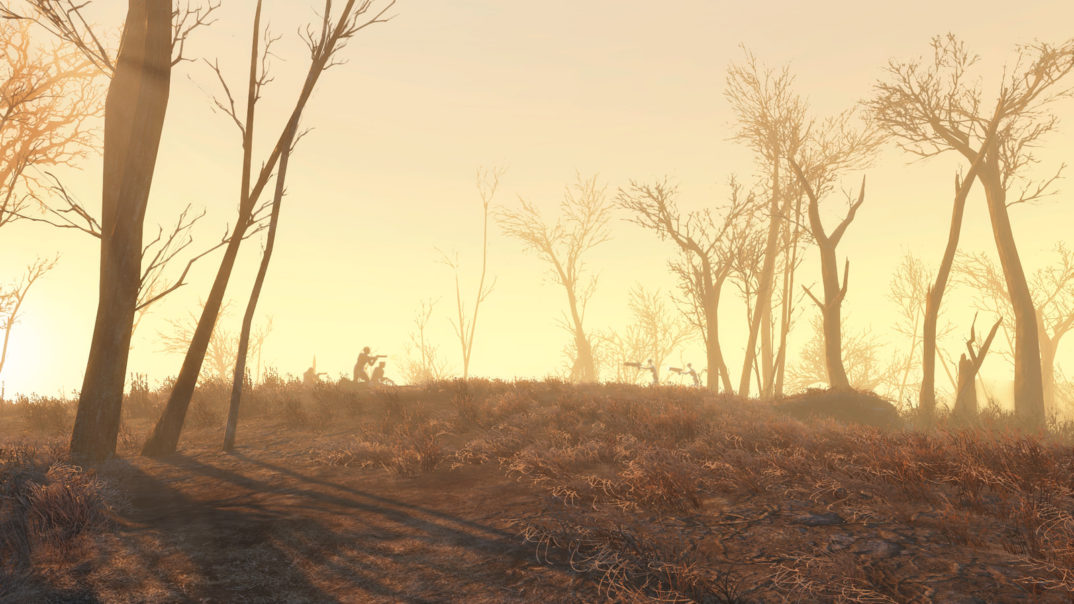Evolving Apocalyptic Narratives and the Ethics of Fallout
Since the first atom bombs fell on Hiroshima and Nagasaki in 1945, pop culture has imagined and re-imagined apocalyptic narratives. From the “atomic pop” that proliferated on the radio in the 1940s and 50s, to the 2008 and 2016 releases of post-apocalyptic video games Fallout 3 and Fallout 4, this recurring theme exemplifies how ingrained the apocalyptic narrative is in Western culture. However, a shift can be seen from apocalyptic fears in the years after the bomb, to the post-apocalyptic heroic narratives told today in video games like Fallout. Although the apocalypse was once seen as the ultimate end, post-apocalyptic narratives make room for life afterwards, a life inherently fraught with ethical dilemmas about how to rebuild society. Where did apocalyptic narratives shift from ultimate annihilation to a heroic narrative about rebuilding society, and how does Fallout provide a moral compass for navigating the post-apocalypse?
Starting in 1946, “atomic pop” proliferated through the Atomic Age and the Cold War, engendering the apocalyptic narrative into American culture. The Buchanan Brother’s 1946 country hit “Atomic Power” exemplifies the popular opinion held in the early years after the bomb: “Hiroshima, Nagasaki paid a big price for their sin/When scorched from the face of earth their battles could not win/But on that day of judgment when comes a greater power/We will not know the minute and we’ll not know the hour.” This song brings together the complicated relationship between American patriotism for winning the war, and the immediate visceral fear of future nuclear war. Atomic war is also caught up in notions of divine judgment, implying that the next use of atomic weapons would certainly destroy the entire world. That life might continue after the next nuclear war was not considered an option.
Later songs in the 50’s and 60’s are notably less serious, and often compared the power of atomic bombs to sex, including The Cuff Links’ 1956 “Guided Missiles.” Throughout the year after 1945, atomic pop songs were mixed with sarcastic and licentious comparisons and a quiet perpetual fear of real nuclear war. And this theme continues in music today. Radiohead’s 2007 song “Four Minute Warning” begins with the British Broadcasting Company’s real recorded warning message that was prepared during the Cold War. This recent song combines Cold War fears with the still-relevant fear of nuclear war. This shows that even 62 years after the first atomic bombs were dropped, the fear of nuclear war has persisted and remains relevant in pop culture.
Songs describing nuclear fear tend to emphasize the lack of individual agency in atomic war. The average person going to work and back every day has little to no choice about whether or not a nuclear bomb is dropped on their city today, and songs relate to this fear. The invention of narrative video games provides a different outlet, one that allows players the hope of living after nuclear fallout and creating a new life for themselves. Fallout 4 features 110,000 lines of dialogue and 80 square kilometers of space to explore, making the narrative game more immersive than other forms of apocalyptic narrative. Playing completely through the game takes the same amount of time as watching the Godfather trilogy 40 times, making Fallout 4 arguably not just a video game, but a complete virtual world that takes players into a life after the nuclear fallout. And this world comes with its own complete set of ethical dilemmas.
Fallout 3, released in 2008, and Fallout 4, released last November, provide players with ethical dilemmas and room to make decisions, going so far as to distinguish between good karma and bad karma, which will affect a player’s choices later in the game. Each Fallout game in the series has made a way to distinguish between good choices and bad ones, and Fallout 3 especially makes this clear with a karma scale visible to the player. Almost every action within Fallout 3 causes one to gain or lose karma points, the amount depending on the gravity of the action taken. For example, choosing to detonate the nuclear warhead resting in the town of Megaton, causing all the town’s inhabitants to die in the process, causes one to lose 1,000 karma points, the most one can possibly lose with a single action. Other small actions, such as giving beggars purified water, slowly increases good karma. Fallout 4 also has a morality scale but makes it less obvious. Various companions will like or dislike actions the player takes depending on their personality. For example, a good character will like it when the player helps others without requiring a reward, whereas an evil character will like actions that are selfish or hurt others.
There are multiple theories about why post-apocalyptic video games are especially popular. First, post-apocalyptic video games offer a human agency that is not found in the real-world equivalent situation. Outside of the video game, the average person has no control over nuclear warfare. What games like Fallout offer is a chance to be the survivor, the “Lone Wanderer” who will decide the fate of the Wasteland, a theme seen in many other types of fiction. With post-apocalyptic video games as opposed to other genres like fantasy, the latter hits closer to home and is more realistic, more possible.
Secondly, post-apocalyptic video games offer a “radical freedom” from societal and ethical norms. This offers the player the opportunity to imagine life without its many constrictions: school, homework, work, family relationships, social media. The ethical freedom in Fallout both allows one to act as they hope they would in a real apocalyptic scenario, but also in the safety of knowing that it isn’t actually happening, begging the question, “Who would you want to be, what would you want to do, if none of it really mattered?” The choice to be virtuous, optimistic that one would act the same in a real situation, or to be rebellious and unethical because it’s “just a videogame” is entirely up to the player.
However, some may say that the ethical choices in Fallout are not as open as they appear. For starters, the seemingly “near limitless state of opportunities” is actually governed by the moral code the game producers programmed into it. Although the player is free to make their own choices, the way those choices play out are already set. What makes the team at Bethesda qualified to decide the moral code for an alternate world, one that is supposed to mirror our own? Some decisions rely on common sense. Murder is wrong, stealing is wrong, saving the innocent is good. But many decisions in the games are not that simple. To remedy this, the game designers allotted different opportunities and awards for each decision. Some situations are so complex and ambiguous that the designers decided not to have karmic consequences for the player’s decision, as if to admit that sometimes there is no clear right answer. Although the game designers essentially set the moral code for the Fallout universe, they realize their own limits.
Apocalyptic narratives have changed drastically since the 1950’s. Earlier versions of this narrative were bitterly pessimistic and sarcastic in the face of impending annihilation. Recent interpretations of the apocalypse have emphasized the post-apocalypse. This imagining almost attempts to skip over the gruesome reality of nuclear war to the part where humanity’s next great chapter begins. How would Fallout be different if the adventure didn’t start 200 years after the nuclear fallout, but before or during? The emotional impact on players would likely be much different. It will be difficult to top Bethesda’s immersive Fallout universe, but it will be interesting to see how post-apocalyptic narratives continue to evolve.





